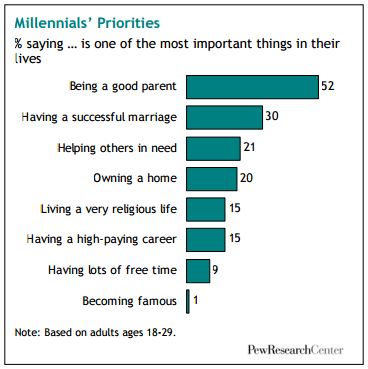24 Constructive Feedback Examples for Employee Reviews
Constructive feedback is a powerful way to build strong relationships and inspir...

Managing millennials can be a challenge. They need constant stimulation—something that baby boomers and gen Xers don’t always need as much of. They want, and even need, to use technology in every aspect of their job. And they like to be creative.
While there’s nothing wrong with any of these traits, they are different enough from the way the other generations work that they may cause some frustration amongst managers. But by understanding how millennials think, you can better manage both their strengths and their weaknesses.
This article will give you nice strategies to help you look past the myths associated with the millennial worker and to better manage this new majority in the workforce.
 Millennials grew up in the shadow of social networking. Many, if not most, never knew a world without it. Because of this, millennials are more inclined to want to work in groups. Based on an IBM workforce study conducted in 2015, almost 60% of millennials felt that they made better decisions when receiving input from many different sources.
Millennials grew up in the shadow of social networking. Many, if not most, never knew a world without it. Because of this, millennials are more inclined to want to work in groups. Based on an IBM workforce study conducted in 2015, almost 60% of millennials felt that they made better decisions when receiving input from many different sources.
Consider breaking the team into smaller groups of 2, 3, or 4 and assigning each smaller group a specific task. This will give millennials the social interaction they desire while still making it possible to work on a number of tasks at the same time.
A common myth about the millennial workforce is that they need constant validation. Ray Carvey, executive vice president for Harvard Business Press, explains what is actually happening:
“Feedback is very important to them. A lot of what millennials will someday need to know to do their job hasn’t been invented yet. So there’s an undercurrent of continuous development, continuous learning.”
Rather than needing validation, millennials need training and feedback. In fact, millennials rank training at the top of their list of “must-haves”. Technology in the workplace is constantly changing. Workers who contend with this reality need training to do their job and feedback to let them know that they are doing it well amidst all that change.
This can be a huge benefit to managers because millennials don’t need to be encouraged to improve; they’re going to seek out ways to make it happen. So rather than seeing this trait as a need for validation, view it as a need for improvement.
Implement weekly or monthly training sessions to make the millennial worker feel comfortable in their job. Take those opportunities to provide feedback regarding their performance and the use of changing technologies. This will make them feel that they are doing well.
Yes, millennials need lots of feedback. They also need their managers to deliver this feedback in a way that resonates with them. Deliver the feedback by building on their strengths while at the same time acknowledging areas in which they can improve.
Dr. Joanne G. Sujansky, CSP and Jan Ferri-Reed, Ph.D. writing for Contact Center Solutions gives the following examples of good and bad delivery methods.
Bad: “Your behavior is not acceptable. You need to stop (the problem behavior) now because you are causing problems for others. If you don’t change there will be consequences. Correct it and we’ll talk about this again at a later time.”
Good: “I’m very happy with many of the things that you’ve been doing, such as (give examples). However, if you improve (the problem behavior) it will be good for you and for the organization. I understand what you intended, but if you make these changes you’ll be more successful. However, if you don’t make the changes there will be consequences (give examples). What are you willing to commit to? Let’s agree to review progress on the changes that you committed to make by (set a date).”
Sujansky and Ferri-Reed go on to say that this method of feedback might surprise you. You might find that it works well for all generations of employees, not just millennials.
 Millennials want to use technology in every facet of their job. And since they’ve grown up with it at their fingertips, they’re comfortable enough to use technology effectively and efficiently.
Millennials want to use technology in every facet of their job. And since they’ve grown up with it at their fingertips, they’re comfortable enough to use technology effectively and efficiently.
For managers, that means giving millennials the opportunity to make changes to existing operations. Ask them how they would incorporate novel technologies into the workplace and then consider implementing those technologies.
But don’t let the drive to incorporate technology distract them, or you, from the main purpose: serving the customer. Sometimes more technology isn’t always better for the business, for older workers, or for the customer. 5. Motivate millennials with what excites them Millennials tend to get excited about progress, creativity, and social connection. If you, as a manager, can tap into those motivations, your employees will be more engaged.
To help millennials feel like they are making progress in their job, consider creating rewards for specific responsibilities. Those rewards will be specific to your business but could take the form of head patron happiness or chief of the front-desk. Giving your employees these “stepping-stone” rewards will make them feel like they’re making progress.
Tap into the millennials’ need for creativity by encouraging them to think about innovation. Discuss these topics in your weekly staff meeting and then consider implementing the best solutions.
It’s also important to nurture the millennials’ motivation for social connection. Be sure to emphasise the ways in which your business is giving back to the community and allow your employees to participate in these efforts. Whether it’s through charitable giving, volunteer work, or special community-wide events, your business and your employees will become more engaged.
Millennial workers like to feel connected to a larger purpose. Your company vision can be the bridge between what they do on a daily basis and the big picture toward which your company works.
Jeremy Kingsley, leadership expert and author of Inspired People Produce Results, explains how a company’s vision makes a difference to millennial workers:
“If you can explain the whole picture, it connects the meaning to the person. [The company’s vision] makes employees feel valued, which in turn boosts productivity.”
Unlike the generations before them, millennial workers aren’t just satisfied to punch in, do their work, and punch out. Millennials want their work to have meaning and to produce impact. Showing the millennial how their daily work impacts the company’s vision on a global scale can give them the “big-picture” connection the need.
Another myth that gets thrown around is that millennials are lazy. Rest assured, they’re not. The myth was perpetuated because millennials checking their Facebook page or surfing Instagram during work hours became an all too common sight.
But consider for a moment, how connected your employees have become to the work they do. It’s now possible to get work done at all hours of the day from almost anywhere on the planet. Millennial workers don’t think twice about working from 11 to 11:30 p.m. from their home computer just to finish a small task. As managers, we sometimes take this for granted and come to expect it.
When that happens, we have to realize that if work is going to seep over into personal time, personal time is going to seep over into work. This isn’t an excuse for excessive use of social media (unless it’s their job), but we have to treat them fairly and allow them to balance work and personal life. In their mind, the hour they took out of their personal life last night to solve some business problem needs to be offset by a half hour on Facebook during work hours.
 Millennials want to contribute to those around them by doing work that matters. A Pew Research Center study from 2010 reports that helping others in need ranked above having a high-paying career.
Millennials want to contribute to those around them by doing work that matters. A Pew Research Center study from 2010 reports that helping others in need ranked above having a high-paying career.

Show your employees that their work is helping others by supporting local charities or participating in community events. Donate food to block parties or sponsor a little-league baseball team. In addition, give your employees the opportunity to contribute to these efforts as well.
Work/life balance is important and millennials are willing to sacrifice pay to achieve it. This means that they need to have the option to make their work schedule fit their life rather than their life fit their work schedule.
Get creative with your scheduling. Consider working four longer days each week and allowing employees to take the fifth day off. Some employees may have a Monday off while others may have a Friday off. Still others may have a Wednesday off.
Another flexible means of scheduling is to create a block of time when your entire team needs to be present. Then allow employees to determine how early or late they will be at work around that block of time.
Implementing changes in management style to accommodate the attitudes of millennial workers can reap rewards both now and in the future. Managing millennials in a way they understand can result in improved morale, decreased turnover, and better employee engagement.
These changes may not be easy and may seem unnecessary—especially for older managers used to a different style. But incorporating these strategies for managing millennials is well worth the effort.
See Here For Last Updated Dates: Link
This content is for informational purposes and is not intended as legal, tax, HR, or any other professional advice. Please contact an attorney or other professional for specific advice.
Schedule faster, communicate better, get things done.